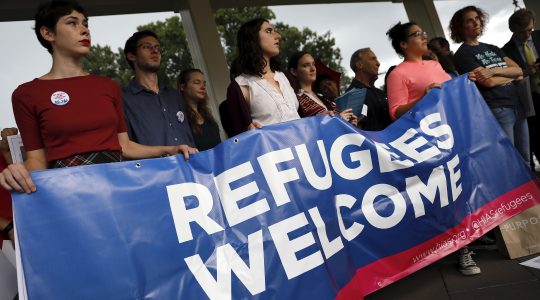WASHINGTON — Should the U.S. government address antisemitism on its own, or as part of the broader fight against prejudice?
That’s the question that occupied — and divided — Republican and Democratic senators on Tuesday at an emotional hearing that, at one point, was brought to a stop by someone shouting antisemitic invective.
Tensions were evident almost immediately when the Judiciary Committee’s Democratic chairman, Sen. Richard Durbin of Illinois, and its top Republican, Sen. Lindsey Graham of South Carolina, clashed over the hearing’s aims and even its name, “Threat to Justice Everywhere: Stemming the Tide of Hate Crimes in America.”
In introductory comments, Durbin noted, as the FBI and extremism watchdogs have warned, that violence tends to come more from the far right than it does from the far left whose protests against Israel’s military campaign in Gaza have roiled campuses.
Graham and other Republicans wanted the hearing to focus solely on campus antisemitism.
“The goal was to have a hearing about why it’s so hard to go to school if you’re Jewish, and it’s really hard to go to these schools if you’re Jewish, you’re being knocked down, you’re being spat on,” he said. “This is not the hearing we’re getting, so we’ll work with what we’ve got.”
Durbin said he was not ready to emphasize one type of bigotry over another. He noted that the audience included both families of victims of the 2018 Pittsburgh synagogue shooting, as well as of a Palestinian-American child stabbed to death by his landlord last year.
“Prioritizing which group is being discriminated against the worst, I don’t believe is a valid exercise of our authority here,” said Durbin. “What we are trying to do is to identify a problem in America that extends beyond Jewish population to the Arab population to the Palestinian population. All of those hate crimes are unacceptable.”
House Republicans have devoted massive resources to investigating antisemitism on campus but paid comparatively little heed to threats from the far right, which Durbin emphasized were pressing.
“Since 2000 according to federal law enforcement, white supremacists have been responsible for more homicides than any other domestic extremist group,” he said.
The witnesses at the hearing included Maya Berry, the executive director of the Arab American Institute, who authored a comprehensive analysis of the spike in anti-Jewish and anti-Muslim attacks in recent years, and Kenneth Stern, the director of the Bard Center for the Study of Hate and the author of a popular and controversial definition of antisemitism, who were invited by the Democrats. Republicans invited Mark Goldfeder, the director of the National Jewish Advocacy Center, which has filed lawsuits to protect Jews on campuses.
The back-and-forth at the hearing brought to the fore tensions that have been simmering since the Biden administration first rolled out a broad set of anti-extremism initiatives in 2022. Jewish groups said the generalized approach was too diffuse. That led Biden to launch an antisemitism-specific task force in December 2022, and the rollout of a strategy to combat antisemitism in May 2023. Later that year the White House announced a national strategy to combat Islamophobia.
Defenders of the White House’s approach said bigotries are impossible to isolate and can more effectively be combated in unison. But some conservative groups have complained that Biden’s antisemitism strategy has been diluted by at times addressing other bigotries, a complaint that intensified after Hamas launched its war on Israel on Oct. 7.
“This committee should act not just in general, but specifically about what it’s like to be Jewish in America in 2024, and it is not a good story,” Graham said.
Stern and Goldfeder both argued that antisemitism should not be seen in isolation, saying that its expression reverberated in the targeting of other vulnerable populations. Stern said the reverse was true as well: Attacks on other minority groups endangered Jews.
“Antisemitism is at heart a conspiracy theory that sees Jews as conspiring to harm humanity,” he said. “It’s offered as an explanation for what goes wrong in the world. It appears on the right and on the left. It’s also the philosophical backbone of much white supremacy. But we tend to think about antisemitism as only what people say about Jews or Israel, and not enough about how vilification of anyone among us can create a conveyor belt to antisemitism.”
The Orthodox Union, which played a leading role in advocating for an antisemitism strategy, expressed outrage at what it said was the committee’s “watered-down” treatment of antisemitism.
“The hearing failed to center on the unique and rising threat Jewish communities face,” it said in a statement. “Instead, it featured witnesses who did not adequately address the specific challenges of antisemitism and omitted key voices from Jewish students and educators affected by this hate.”
Sen. Ted Cruz, a Texas Republican, echoed that critique, decrying that “we don’t get a hearing on antisemitism, we get a hearing generically on hate.”
While he was speaking, Capitol Police led away a man shouting “F—ing Jews and the Israelis themselves, talk about the 40,000!” referring to Palestinians killed in Israel’s war with Hamas. “Talk about all these people! Why [is it] about antisemitism?”
Another tense moment came when Sen. John Kennedy, a Louisiana Republican, aggressively questioned Berry, claiming that she supported Hamas, Hezbollah and Iran while she repeatedly said she did not.
“You should hide your head in a bag!” Kennedy shouted at Berry, to gasps in the room.
“It’s regrettable that I, as I sit here, have experienced the very issue that we’re attempting to deal with today,” Berry said in response. “This has been, regrettably, a real disappointment, but very much an indication of the danger to our democratic institutions that we’re in now.”
The Anti-Defamation League condemned Kennedy’s “theatrics.”
“Just as it’s antisemitic to hold the Jewish community accountable for actions of the state of Israel, it’s wrong to single out an Arab American as a terrorist sympathizer,” it said in a statement.
Amy Spitalnick, the CEO of the Jewish Council for Public Affairs, a public policy group, said Kennedy’s attack on Berry was “bigoted and dangerous.”
“This is horrific and, as Maya says, illustrates exactly why we’re facing a crisis of hate,” Spitalnick said in a statement. “You can disagree with someone’s Israel/Gaza position without smearing them as a terror supporter. This sort of normalized bigotry only makes Arab Americans – and all of us – less safe.”
JTA has documented Jewish history in real-time for over a century. Keep our journalism strong by joining us in supporting independent, award-winning reporting.






